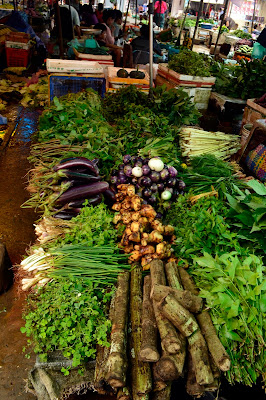Posca, the Roman vinegar-based wonder-drink, is a bit of a mystery, because as much as people keep mentioning it, it is oddly absent from ancient literature. Posca appears in books and articles, being sipped by soldiers and passed around by pals, yet we don't even have a recipe for it!
Basically, we know that soldiers were given a vinegar ration (Vegetius, Concerning Military Matters, 3.3), and that this vinegar could be mixed with water and drunk. (Celsus, On Medicine, 2.27) Hadrian drank posca to 'be one of the soldiers' (Historia Augusta: Hadrian, 10.2), and from this we can infer that it wasn't a drink usually served to the rich. On the contrary, this was a drink sold on the streets! (Suetonius, Vitellius, 12.1) If you think about it, this makes a lot of sense - vinegar is what is left when wine production goes 'wrong', or if wine is left exposed for too long. Knowing how much wine the Romans got through, it stands to reason that there was a lot of vinegar knocking about - so, why not put it to use?
Clearly posca was good enough to keep a Roman army marching - in his soldiering days, Cato the Elder drank posca to fend off raging thirst. (Plutarch, Cato the Elder, 1.10). The sharpness of the vinegar masked the taste of questionable water, the acidity would have helped to kill off certain bacteria, and, according to a recent study, vinegar makes you feel more full after eating bread. We shouldn't rush to say that the Romans knew all of this, but it is important nonetheless. What wasn't so important to the Romans was writing the recipe down, which leaves us in a bit of a pickle.
I've encountered several recipes online, some simplistic, and others quite complex. They're all feasible with regards to ingredients, so we're going to try them all and see how they taste. If anybody can find a reliable source for any of these recipes, please do get in touch! Before starting, make sure you use brewed vinegar (red-wine vinegar preferably), rather than distilled.
1) Ever-so-simple Soldier's Posca
All the sources say is that soldiers drank a mixture of vinegar and water, so that's going to be our starting point. Nothing fancy here.
Ingredients
- 2 tbsp Red Wine Vinegar
- 250ml Water
Methods
- Mix and drink!
Notes
- If you want to replicate that 'stuck-in-the-freezing-cold-north-of-England' feeling, or fancy something a bit more refreshing, use chilled water.
2) Sharp-but-sweet Posca
I've seen several websites suggesting that honey was added to posca (without providing sources mind you). It's a feasible suggestion, so let's pretend we're an entrepreneuring posca salesman looking to one-up the competition, and give it a go.
Ingredients
- 2 tbsp Red Wine Vinegar
- 250ml Water
- 1 tbsp Honey
Methods
- If using set honey, melt it in the microwave for 20 seconds first.
- Add the honey to the water, give it a stir, then add the vinegar.
3) Posh Posca
Everybody loved the honey idea, so now they're all doing it. We have to go one further and make our posca even tastier! I've seen claims, again unsourced, that crushed coriander seed was a favourite addition to posca. It's certainly feasible, although I can't imagine it's what the soldiers and common people got to drink, hence why we're calling it posh posca.
Ingredients
- 2 tbsp Red Wine Vinegar
- 250ml Water
- 1 tbsp Honey
- 1/2 tsp Coriander Seed
Methods
- If using set honey, melt it in the microwave for 20 seconds first.
- Add the honey to the water, give it a stir, then add the vinegar.
- Crush coriander seeds, add them to the drink, and stir it about for a bit. After a few minutes, strain the seeds out, and serve the drink.
Results
Vinegar and water sounds quite horrific if we're being honest, but my oh my is it good! First up was Soldier's Posca, undoubtedly the most 'realistic' version of the drink. No matter what you add to it, posca is always going to smell strongly of vinegar - this makes taking that first sip difficult. Struggle through the smell and you have a very refreshing drink with a bit of a tangy taste. The closest comparison I can think of is lemon water, or lime cordial. Secondly was posca with a touch of honey. This was, in my opinion, the tastiest version of the drink; the sweetness of the honey and the acidity of the vinegar work well together, making the mixture much more drinkable. Finally there was 'Posh Posca' with its added coriander seeds. This tasted much the same as the second drink, with the coriander seed emphasising the citrusy taste. With the added expense and hassle however, you have to ask if it's worth it.
Without a written recipe, we can never truly know what went into posca, meaning that all of the above is just guess work. Given what we do know, I think it's safe to say that posca resembled at least the first of these recipes, although all are equally plausible. All I can do now is urge you to try them, and see what you think.









